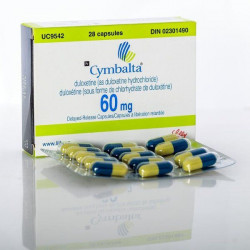Cymbalta (duloxetine) Coupons, Discounts & Cost
Cymbalta (duloxetine) is a drug from the group of antidepressants. One way to save money on the Cymbalta (duloxetine) retail cost regardless of income and insurance status is to use Cymbalta (duloxetine) coupons or discount cards from RXCoupons. Use our Cymbalta (duloxetine) coupons at your online pharmacy and receive up to 75% off the sale price each time you refill your prescription.
What do I need to know about Cymbalta (duloxetine)?
Cymbalta (duloxetine) is a drug from the group of antidepressants. This drug reduces pain, thereby increasing pain threshold in patients with neuropathic pain. It is recommended for patients with depression and different types of diabetic neuropathy.
Cymbalta (duloxetine) is well absorbed after oral administration.
Cymbalta (duloxetine) contraindications
Cymbalta (duloxetine) contraindications: hypersensitivity to duloxetine, angle-closure glaucoma, therapy with MAO inhibitors.
The drug should be used with caution in patients with epileptic seizures, abnormal liver/kidney function, mydriasis, and in patients with suicidal tendencies.
Cymbalta during pregnancy and lactation
Cymbalta (duloxetine) is not recommended during pregnancy and the period of lactation (due to lack of clinical experience).
Patients should inform their doctor if they are planning to become pregnant during Cymbalta therapy.
Cymbalta (duloxetine) dosage and administration
Cymbalta capsules should be taken whole, without chewing. The initial dose of the drug is generally 60 mg once a day, regardless of the meal. The maximum dose is 120 mg (2 times a day).
Cymbalta is well tolerated. It effectively helps fight depression. Patients with symptoms of renal failure should start with a dose of 30 mg.
Cymbalta (duloxetine) side effects
Cymbalta rarely causes side effects. The most frequently observed side effects are as following: dizziness, dry mouth, insomnia, headache. Cymbalta may also cause diarrhea, tremor, weakness, sweating, hot flashes, anorgasmia, decreased libido, ejaculation disorders. Patients with diabetic neuropathy may experience a slight increase in the concentration of glucose in the blood.
CNS: dizziness, sleep disturbances (insomnia or drowsiness), headache, tremor, weakness, blurred vision, anxiety, glaucoma, mydriasis, visual disturbances, agitation, disorientation.
Digestive system: dry mouth, nausea, constipation, diarrhea, vomiting, loss of appetite, hepatitis, jaundice, gastroenteritis, stomatitis.
Musculoskeletal system: muscle tension, bruxism.
Cardiovascular system: palpitations, orthostatic hypotension, syncope, tachycardia, high blood pressure.
Reproductive system: anorgasmia, decreased libido, abnormal ejaculation, erectile dysfunction.
Urinary system: nocturia.
Other reactions: weight loss or weight gain, increased sweating, hot flashes, anaphylactic reactions, thirst, hyponatremia, fever, angioedema, rash, Stevens-Johnson syndrome, hives, dehydration, photosensitivity, dizziness, nausea, headache.
Depressive states are often associated with high suicide risk. As a result, patients with a diagnosis of depression must inform their doctor about any suicidal thoughts and feelings.
Cymbalta therapy may lead to the development of mydriasis. Caution should be exercised in patients with increased intraocular pressure, or in patients at risk of developing acute angle-closure glaucoma.
Patients with hypertension or other diseases of the cardiovascular system should monitor blood pressure.
Patients taking Cymbalta (duloxetine) should be careful when driving or performing potentially dangerous activities (due to the possible risk of drowsiness).
Cymbalta (duloxetine) overdose
There are few reports of overdose with this drug. Symptoms of overdose may include: tremors, convulsions, ataxia, vomiting. Treatment is symptomatic and supportive.
Cymbalta (duloxetine) interaction with other drugs
Patients using Cymbalta should not take drugs with a similar action on the central nervous system (including ethanol). Cymbalta should not be mixed with MAO inhibitors, as this may lead to serious complications (myoclonus, hyperthermia, coma). Do not use this medication within 14 days after the end of therapy with MAO inhibitors.
Cymbalta may cause drowsiness. Therefore, patients taking this drug need to be careful when driving.

